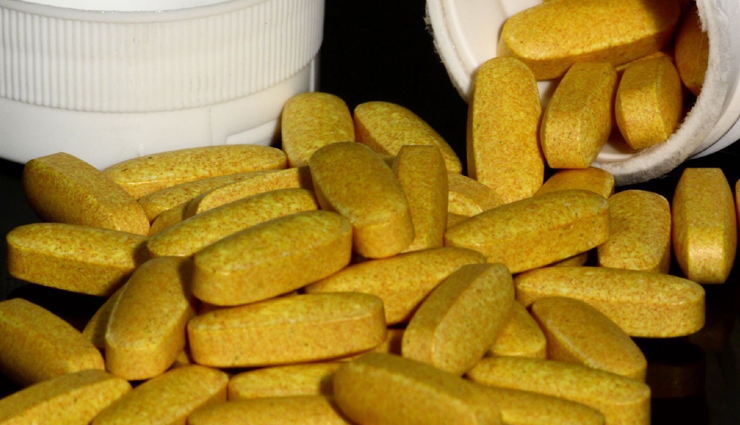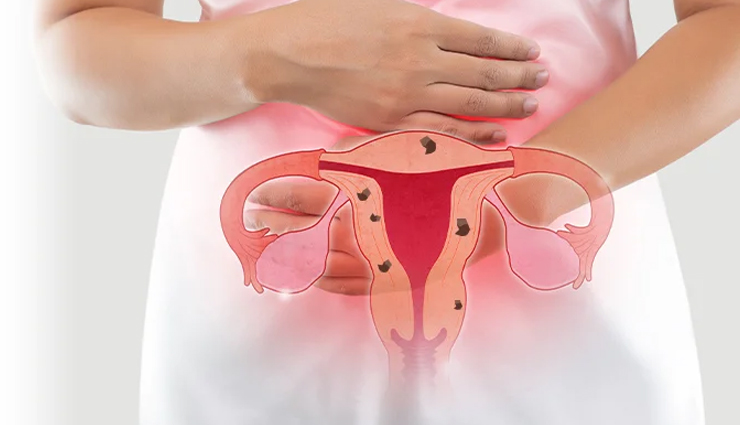- Home›
- Healthy Living›
- 10 Home Remedies To Heal Adenomyosis + Causes And Diet
10 Home Remedies To Heal Adenomyosis + Causes And Diet
By: Priyanka Maheshwari Thu, 13 July 2023 11:23:45

Adenomyosis is a condition that affects the uterus, specifically the endometrium (the inner lining). It occurs when the tissue that normally lines the uterus starts growing into the muscular wall, resulting in an enlarged, thickened, and tender uterus.
Although the exact cause of adenomyosis is not fully understood, hormonal imbalances, particularly elevated estrogen levels, are believed to contribute to its development. It typically affects women in their 30s to 50s and may be more common among those who have had previous uterine surgery or childbirth.
The symptoms of adenomyosis can be similar to other conditions like fibroids or endometriosis, making diagnosis challenging. Common symptoms include heavy and prolonged menstrual bleeding, severe menstrual cramps, pelvic pain, bloating, and pain during intercourse. Some women may also experience an enlarged uterus, leading to a sense of abdominal fullness.
To diagnose adenomyosis, healthcare providers may perform a physical examination, pelvic ultrasound, or MRI to assess the uterus and confirm the condition.
Treatment options for adenomyosis depend on the severity of symptoms and future fertility plans. Conservative approaches include pain management with over-the-counter medications, hormonal medications to regulate menstrual cycles, and the use of hormone-releasing intrauterine devices (IUDs). In more severe cases, surgical interventions like a hysterectomy (removal of the uterus) may be considered. It's important to note that medical interventions are often necessary for severe cases, and discussions with healthcare professionals are crucial to determine the best course of action.
While medical interventions are commonly recommended, several home remedies can help manage the symptoms of adenomyosis and promote overall well-being. In this article, we will explore 10 natural remedies that can provide relief. It's important to keep in mind that these remedies should be used in conjunction with medical treatment and discussed with a healthcare professional.

# Heat Therapy
Heat therapy, also known as thermotherapy, is a non-invasive and natural approach often used to alleviate pain and discomfort associated with adenomyosis. It involves applying heat to the affected area, typically the lower abdomen, to help relax muscles, improve blood flow, and reduce pain sensations. Here's how heat therapy can work in adenomyosis:
Muscle Relaxation: Heat applied to the lower abdomen can help relax the muscles surrounding the uterus. This can be particularly beneficial during menstruation when the uterus contracts to shed its lining, causing pain and cramping. Heat helps to soothe the muscle tension and reduce spasms, leading to pain relief.
Improved Blood Circulation: Heat therapy promotes vasodilation, which is the widening of blood vessels. This dilation increases blood flow to the area, supplying oxygen and nutrients while removing waste products. Improved blood circulation can help reduce inflammation, promote healing, and ease discomfort associated with adenomyosis.
Pain Sensation Reduction: Heat can stimulate the nerve endings in the skin, which can help override pain signals traveling to the brain. By distracting the brain with the sensation of heat, the perception of pain can be diminished, providing temporary relief.
Relaxation and Stress Reduction: Heat therapy has a calming effect and can promote relaxation, which is particularly beneficial for individuals with adenomyosis. Stress and anxiety can exacerbate pain and discomfort, and heat therapy helps to create a soothing environment that encourages relaxation and overall well-being.
Heat therapy can be applied in various ways, including using heating pads, hot water bottles, warm compresses, or taking warm baths. It's important to ensure that the heat source is not too hot and to use a protective barrier, such as a towel, between the heat source and the skin to avoid burns.

# Herbal Teas
Herbal teas can be a soothing and natural remedy to help manage the symptoms of adenomyosis. While they may not directly treat the condition, they can provide relief from discomfort and promote overall well-being. Here's how herbal teas may work in adenomyosis:
Pain Relief: Certain herbal teas, such as chamomile, ginger, and peppermint, have analgesic properties that can help alleviate menstrual cramps and pelvic pain associated with adenomyosis. These teas contain compounds that can help relax the muscles and reduce pain sensations, providing temporary relief.
Anti-Inflammatory Effects: Some herbal teas, like turmeric and green tea, possess anti-inflammatory properties. Adenomyosis involves inflammation within the uterus, and consuming anti-inflammatory teas can help reduce inflammation, potentially easing symptoms such as bloating and discomfort.
Relaxation and Stress Reduction: Herbal teas have been used for centuries to promote relaxation and reduce stress. Adenomyosis can be accompanied by emotional stress and anxiety, which can exacerbate symptoms. Drinking herbal teas like chamomile or lavender can help calm the mind, induce relaxation, and promote a sense of well-being.
Hormonal Balance: Certain herbal teas, such as red clover or raspberry leaf tea, are believed to have hormone-regulating properties. Adenomyosis is influenced by hormonal imbalances, particularly excess estrogen, and these teas may help support hormone balance, potentially alleviating symptoms associated with hormonal fluctuations.

# Dietary Modifications
Making dietary modifications can have a supportive impact on managing the symptoms of adenomyosis. While they may not directly treat the condition, specific changes in your diet can help reduce inflammation, promote hormonal balance, and contribute to overall well-being. Here's how dietary modifications can be beneficial for adenomyosis:
Minimize Inflammatory Foods: To alleviate symptoms associated with adenomyosis, it's recommended to limit or avoid inflammatory foods. These include processed foods, refined sugars, saturated fats, and excessive alcohol consumption. Such foods can contribute to inflammation, which may worsen symptoms.
Emphasize Anti-Inflammatory Foods: Incorporating anti-inflammatory foods into your diet can help reduce inflammation and support your overall health. Include plenty of fruits, vegetables, whole grains, legumes, and healthy fats like avocados, nuts, and seeds. These foods contain antioxidants and phytochemicals that combat inflammation.
Omega-3 Fatty Acids: Ensure you include sources of omega-3 fatty acids in your diet, as they possess anti-inflammatory properties. Fatty fish like salmon, mackerel, and sardines are excellent choices, as are plant-based sources like chia seeds, flaxseeds, and walnuts. Consult a healthcare professional before considering omega-3 supplements.
Increase Fiber Intake: Consuming an adequate amount of dietary fiber can regulate estrogen levels in your body and promote healthy digestion. Incorporate whole grains, fruits, vegetables, legumes, and seeds into your meals to boost your fiber intake.
Hormone-Balancing Foods: Certain foods can help promote hormonal balance, which is crucial for managing adenomyosis. Include foods rich in phytoestrogens, such as soy products, flaxseeds, and lentils, as they can assist in modulating estrogen levels. Additionally, cruciferous vegetables like broccoli, cauliflower, and kale contain compounds that support estrogen metabolism.
Hydration: It's essential to maintain proper hydration by drinking an adequate amount of water throughout the day. Hydration contributes to overall health and can help reduce bloating and water retention often associated with adenomyosis.

# Essential Oils
Essential oils are concentrated plant extracts that contain aromatic compounds. While they are not a direct treatment for adenomyosis, certain essential oils may offer relief from symptoms and support overall well-being. Here's how essential oils may work in adenomyosis:
Relaxation and Stress Relief: Many essential oils have calming properties that can help promote relaxation and reduce stress, which can contribute to symptom relief. Lavender, chamomile, and ylang-ylang are examples of essential oils known for their relaxation benefits.
Pain Management: Some essential oils possess analgesic properties and may help alleviate pain associated with adenomyosis. Oils like peppermint, clary sage, and lavender can be applied topically (diluted with a carrier oil) or used in aromatherapy to provide temporary pain relief.
Anti-Inflammatory Effects: Certain essential oils have anti-inflammatory properties that can help reduce inflammation associated with adenomyosis. Examples include frankincense, ginger, and turmeric essential oils. These oils can be used topically (diluted) or inhaled through diffusion.
Hormone Balance: Essential oils like clary sage and geranium are believed to have hormone-balancing effects. Hormonal imbalances, particularly excess estrogen, can contribute to adenomyosis symptoms. These essential oils may help support hormonal equilibrium.

# Gentle Exercise
Gentle exercise can be beneficial for individuals with adenomyosis as it promotes overall well-being, improves circulation, and helps manage symptoms. While exercise may not directly treat adenomyosis, it can contribute to pain management and overall physical and mental health. Here's how gentle exercise can work in adenomyosis:
Pain Relief: Engaging in gentle exercise, such as walking, yoga, or swimming, can help alleviate pain associated with adenomyosis. Exercise stimulates the release of endorphins, which are natural pain-relieving chemicals in the body. It can also help relax muscles and reduce tension, potentially easing pelvic pain and cramping.
Improved Circulation: Exercise increases blood flow and circulation throughout the body, including the pelvic area. Adequate blood circulation helps deliver oxygen and nutrients to tissues, supporting their health and function. Improved circulation can also reduce inflammation and promote healing.
Stress Reduction: Adenomyosis can be accompanied by emotional stress and anxiety, which can worsen symptoms. Gentle exercise acts as a stress reliever by promoting the release of endorphins, reducing cortisol (stress hormone) levels, and providing an outlet for emotional tension. This can contribute to overall well-being and help manage the impact of stress on adenomyosis symptoms.
Hormone Balance: Regular exercise can help maintain hormone balance in the body. It may support the regulation of estrogen levels, which is important in managing adenomyosis symptoms, as hormonal imbalances can exacerbate symptoms. Exercise can also help manage weight, which may further support hormone balance.
Overall Well-Being: Engaging in gentle exercise promotes a sense of well-being, improves mood, and enhances quality of life. It can boost energy levels, improve sleep, and increase body awareness. These benefits contribute to overall physical and mental health, which can positively impact individuals with adenomyosis.

# Stress Management
Stress management is an important aspect of managing adenomyosis as it can significantly impact symptoms and overall well-being. While it may not directly treat the condition, effectively managing stress can help alleviate symptoms and improve quality of life. Here's how stress management can work in adenomyosis:
Symptom Reduction: Adenomyosis symptoms, such as pelvic pain, cramping, and bloating, can be aggravated by stress. By adopting stress management techniques, individuals may experience a reduction in the intensity and frequency of these symptoms. Stress management can help promote relaxation, decrease muscle tension, and alleviate discomfort associated with adenomyosis.
Hormonal Balance: Stress can disrupt hormonal balance in the body, and hormonal imbalances can contribute to adenomyosis symptoms. Engaging in stress management activities, such as mindfulness or meditation, can help regulate stress hormones like cortisol, which may support hormonal equilibrium and alleviate symptoms.
Pain Perception: Stress can affect how individuals perceive pain. High stress levels can amplify pain sensations and make them more challenging to cope with. By managing stress effectively, individuals with adenomyosis may experience a reduction in pain perception, making it easier to manage discomfort and improve their overall well-being.
Emotional Well-being: Adenomyosis can have a significant impact on emotional health, leading to feelings of frustration, anxiety, and sadness. Implementing stress management techniques can improve emotional well-being by reducing stress levels and promoting a more positive mindset. This can contribute to better coping mechanisms and an improved outlook on managing adenomyosis.
Quality of Life: Stress management can enhance overall quality of life for individuals with adenomyosis. By effectively managing stress, individuals may experience improved energy levels, better sleep, enhanced relationships, and increased enjoyment of daily activities. This can lead to a more fulfilling and satisfying life despite the challenges of the condition.

# Magnesium Supplements
Magnesium supplements are often recommended as a complementary approach to managing symptoms associated with adenomyosis. While they do not directly treat the condition, magnesium supplements may provide certain benefits. Here's how magnesium supplements can potentially work in adenomyosis:
Muscle Relaxation: Magnesium is known for its muscle-relaxing properties. In adenomyosis, where pelvic pain and cramping are common, magnesium can help relax the smooth muscles of the uterus, potentially reducing pain and discomfort.
Pain Relief: Adequate magnesium levels in the body are important for pain management. Magnesium plays a role in regulating nerve function and reducing the transmission of pain signals. By supplementing with magnesium, individuals with adenomyosis may experience a reduction in pain intensity.
Hormone Balance: Magnesium plays a role in hormone regulation and may help promote hormonal balance. Hormonal imbalances, particularly excess estrogen, can contribute to adenomyosis symptoms. By supporting hormone balance, magnesium may help alleviate symptoms associated with hormonal fluctuations.
Stress Reduction: Magnesium has calming effects on the nervous system and can help reduce stress and anxiety. Adenomyosis can be accompanied by emotional stress, which can worsen symptoms. Magnesium supplements may promote relaxation and improve overall well-being.
Improved Sleep: Magnesium is involved in the regulation of neurotransmitters that contribute to sleep quality. Adequate magnesium levels can promote better sleep, which is important for overall health and can help manage symptoms associated with adenomyosis.
It's important to note that magnesium supplementation should be discussed with a healthcare professional, as individual needs may vary.

# Omega-3 Fatty Acids
Omega-3 fatty acids, including eicosapentaenoic acid (EPA) and docosahexaenoic acid (DHA), offer numerous health benefits and may have positive effects on managing symptoms associated with adenomyosis. Here's how omega-3 fatty acids can potentially work in adenomyosis:
Anti-Inflammatory Properties: Omega-3 fatty acids possess powerful anti-inflammatory effects. Adenomyosis involves inflammation within the uterus, and chronic inflammation can exacerbate symptoms. By incorporating omega-3 fatty acids into your diet, individuals with adenomyosis may experience a reduction in inflammation, potentially alleviating pain, bloating, and other inflammatory symptoms.
Hormone Regulation: Omega-3 fatty acids play a role in promoting hormone balance, which is vital in managing adenomyosis symptoms. Hormonal imbalances, particularly excess estrogen, can contribute to the severity of adenomyosis symptoms. Omega-3 fatty acids may support hormone regulation, helping to mitigate the impact of hormonal fluctuations and related symptoms.
Pain Management: Omega-3 fatty acids possess analgesic properties and may help manage the pain associated with adenomyosis. They can influence the production of inflammatory substances called prostaglandins, which play a role in pain signaling. By modulating prostaglandin levels, omega-3 fatty acids may help alleviate pelvic pain and cramping.
Improved Circulation: Omega-3 fatty acids contribute to cardiovascular health by enhancing blood flow and reducing the likelihood of clot formation. Adequate circulation is essential for delivering oxygen and nutrients to tissues, including the uterus. Improved blood flow may contribute to better overall uterine health and potentially alleviate symptoms associated with adenomyosis.
Mental Well-being: Omega-3 fatty acids play a crucial role in brain health and mood regulation. Adenomyosis can be accompanied by emotional stress and mood disturbances. Omega-3 fatty acids may help support mental well-being, potentially reducing anxiety, depression, and other emotional symptoms associated with adenomyosis.
Omega-3 fatty acids can be obtained through dietary sources such as fatty fish (e.g., salmon, mackerel, sardines), walnuts, chia seeds, flaxseeds, and fortified foods. Alternatively, omega-3 supplements derived from fish oil or algae-based sources can be considered after consulting with a healthcare professional.
It's important to note that individual responses to omega-3 fatty acids may vary, and it may take time to observe their effects. Consistently incorporating omega-3-rich foods or supplements into your routine is key for potential benefits.
While omega-3 fatty acids can be beneficial, they should be used as part of a comprehensive treatment plan for adenomyosis and should not replace any prescribed medications or lifestyle modifications recommended by your healthcare professional.

# Acupuncture
Acupuncture, a traditional Chinese medical practice involving the insertion of thin needles into specific points on the body, is believed to stimulate the body's natural healing response and promote balance within the body's energy pathways. When considering adenomyosis, acupuncture may provide several potential benefits:
Pain Management: Acupuncture is commonly used to alleviate pain. By targeting specific acupuncture points, it is thought to reduce pain signals, trigger the release of natural pain-relieving chemicals like endorphins, and improve blood circulation. Individuals with adenomyosis may experience relief from pelvic pain, cramping, and related discomfort through acupuncture.
Hormone Regulation: Acupuncture may have an impact on hormonal balance. It is believed to stimulate the release of hormones such as beta-endorphins and serotonin, which can help regulate hormonal activity. By promoting hormonal balance, acupuncture might help alleviate hormonal imbalances associated with adenomyosis.
Stress Reduction: Emotional stress often accompanies adenomyosis and can worsen symptoms. Acupuncture has been shown to have a calming effect on the nervous system, inducing relaxation and reducing stress levels. By addressing stress, acupuncture may aid in managing emotional well-being and improving overall symptom management.
Improved Blood Flow: Acupuncture is believed to enhance blood circulation by stimulating blood vessels, facilitating the flow of oxygen and nutrients to tissues. Improved blood flow may help reduce inflammation, support tissue healing, and alleviate symptoms associated with adenomyosis.
Individualized Treatment: Acupuncture treatments are customized to each individual, considering their specific symptoms, overall health, and constitutional factors. This tailored approach allows for a comprehensive assessment and treatment plan that addresses the unique needs of each person with adenomyosis.
It's crucial to seek acupuncture treatment from a qualified and licensed acupuncturist. They will consider your medical history, current symptoms, and treatment goals to develop an appropriate plan. Acupuncture is often used as a complementary therapy alongside conventional medical treatments for adenomyosis, and consulting with your healthcare provider is advisable to determine the most suitable approach for your situation.
While acupuncture has shown promise for some individuals with adenomyosis, its effectiveness can vary. It may require multiple sessions over time to achieve optimal results.

# Adequate Rest and Sleep
Getting sufficient rest and quality sleep is crucial for overall well-being and managing adenomyosis symptoms. Create a calming bedtime routine, ensure a comfortable sleep environment, and aim for seven to eight hours of sleep each night.

Causes And Risk Factors For Adenomyosis
The exact causes of adenomyosis are not fully understood, but several factors are believed to contribute to its development. While any woman can develop adenomyosis, certain risk factors may increase the likelihood of developing the condition. Here are some potential causes and risk factors associated with adenomyosis:
Hormonal Imbalances: Adenomyosis is thought to be influenced by hormonal imbalances, particularly an excess of estrogen relative to progesterone. Estrogen promotes the growth of the endometrial tissue, and when levels are high, it may lead to the abnormal growth of endometrial cells into the muscular wall of the uterus.
Previous Uterine Surgery: Women who have had prior uterine surgeries, such as a cesarean section or fibroid removal, may have an increased risk of developing adenomyosis. The disruption of the uterine lining during these procedures could potentially facilitate the invasion of endometrial tissue into the uterine wall.
Childbirth: Adenomyosis is more commonly observed in women who have given birth, especially multiple times. The stretching and thinning of the uterine wall during pregnancy and childbirth may create an environment conducive to the infiltration of endometrial cells.
Middle-Age: Adenomyosis typically affects women in their 30s to 50s, with symptoms often worsening during the perimenopausal period. The hormonal changes that occur during this time may contribute to the development and progression of adenomyosis.
Endometriosis: There is an association between adenomyosis and endometriosis, another condition where endometrial tissue grows outside the uterus. It is believed that the same hormonal imbalances and mechanisms that contribute to endometriosis may also play a role in the development of adenomyosis.

Best Diet For Adenomyosis
Here are some dietary recommendations that may be beneficial for individuals with adenomyosis:
Anti-Inflammatory Foods: Focus on consuming a diet rich in anti-inflammatory foods, such as fruits, vegetables, whole grains, legumes, and healthy fats like avocados, nuts, and seeds. These foods can help reduce inflammation in the body, potentially alleviating symptoms associated with adenomyosis.
Omega-3 Fatty Acids: Include omega-3 fatty acids in your diet, as they possess anti-inflammatory properties. Good sources of omega-3s include fatty fish (salmon, mackerel, sardines), chia seeds, flaxseeds, and walnuts. Alternatively, consider omega-3 supplements after consulting with a healthcare professional.
Fiber-Rich Foods: Consume an adequate amount of dietary fiber, as it helps support healthy digestion and may help regulate estrogen levels in the body. Include whole grains, fruits, vegetables, legumes, and seeds in your diet to increase your fiber intake.
Reduce Inflammatory Foods: Limit or avoid foods that can promote inflammation, such as processed foods, refined sugars, saturated fats, and excessive alcohol consumption. These foods can exacerbate symptoms and contribute to hormonal imbalances.
Plant-Based Proteins: Incorporate plant-based proteins into your meals, such as beans, lentils, tofu, tempeh, and quinoa. These protein sources provide essential nutrients and are generally lower in saturated fats compared to animal-based proteins.
Calcium and Vitamin D: Adequate intake of calcium and vitamin D is important for maintaining bone health, especially for women with adenomyosis who may be at a higher risk of osteoporosis. Include dairy products, leafy greens, fortified plant-based milk, and sunlight exposure to meet your calcium and vitamin D needs.
Stay Hydrated: Drink plenty of water to maintain hydration and support overall health. Hydration is important for optimal bodily functions and may help reduce bloating and water retention.





